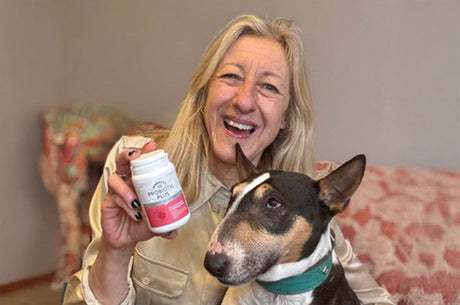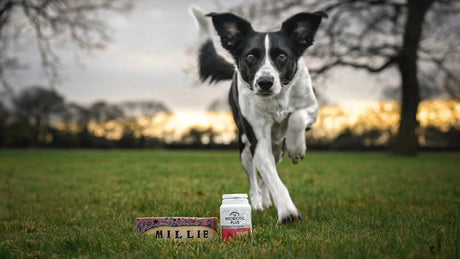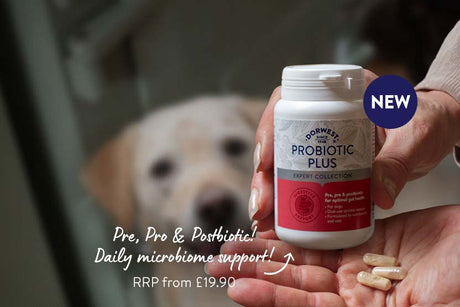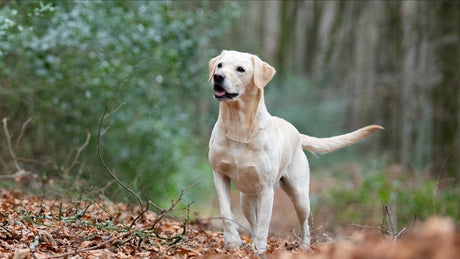
In short haired dogs a little ‘dandruff’ or dry skin can quickly be very evident, however dry skin isn’t as easy to spot in longer coated dogs – if you part the coat you may see the odd flakes of skin flaking away. Dry skin can make your dog very itchy and this can get worse at certain times of the year. It can also be accompanied by a dry coat, which is where Omega Star® for Dogs, a nutrient rich oil that can be added to their food to improve dogs’ coats, can help.
We share our expertise on how to help dogs’ dry skin and itching, as well as the best herbal supplements for dogs we recommend as a dry skin remedy, including those containing omega 3 for dogs.
Why do dogs get dry skin?
Defective moisture barrier
The skin has a moisture barrier (made up of skin cells, proteins and fats) that helps to retain moisture in the skin. Sometimes this becomes compromised or is just not as good in some dogs as others, and this causes dry skin. It also can allow allergens and bacteria to penetrate further causing dog skin conditions. If this happens, follow these 4 ways to relieve your dog’s skin condition.
Dehydration
Dehydration! Your dog can have mild dehydration which can show as dry skin. If you feed your dog dry food, this automatically absorbs lots of moisture from the body, hence why dogs have an increased thirst. However, often this is not enough to compensate for the drying effects of the dehydrated food.
Allergies
Allergies can make your dog’s skin dry, and they can also make them greasy and oily. They are on the increase, especially in Springtime, and the allergic response by the body can cause sensitivity in the skin and itching.

5 Ways to Improve Your Dog’s Dry Skin
1. Feed a Nutritious Plant-Based Oil
Essential Fatty Acids (EFAs) are essential for the body but the body cannot produce them naturally.Omega Star® for dogs is a 100% natural blend of plant oils, including flaxseed oil for dogs, that are rich in omega 3 and 6. This omega 3 for dogs will help to nourish the skins moisture barrier, as well as help support coat growth and quality.
2. Feed Dog’s Moist Food
Whether this is cooked or raw, shop bought or homemade food. This naturally introduces moisture into the body and doesn’t dehydrate the dog unlike dry food.
3. Lots of Water
Provide a good plentiful source of fresh water and replenish at least daily. In hot weather, you could try adding some ice cubes to the water or cubes of bone broth to make it more appealing.
4. Ensure You Groom Your Dog Regularly
This removes old dead skin and coat which is not good for skin health and renewal. Skin conditions are often the cause of excess moulting in dogs. Evening Primrose Oil Capsules for Dogs can help with dry skin as this supplement contains the highest levels of gamma linolenic acid, the omega 6 fatty acid, beneficial for skin and coat condition.
5.When You Shampoo Your Dog, Do Not Use Human Products
Dogs have a different skin pH to humans and using human products can dry the skin. Try using a natural dog shampoo, without SLS and containing soothing moisturising ingredients such as oatmeal shampoo for dogs. Our Soothe & Calm Shampoo is hydrating, and it restores moisture. It’s also a great dog shampoo for itchy skin, as it restores and rebalances the skin’s quality.
Follow these five tips and your dog’s coat and skin will soon be healthy and flake free. If your dog suffers from more severe skin conditions, please look at using our herbal supplements specifically for this issue, such as Green Releaf® Tablets and Garlic & Fenugreek Tablets For Dogs. Our friendly team of advisors at Dorwest Herbs are always on hand to help on 01308 897272 or email advice@dorwest.com, or connect with us on social media. Plus, get free UK delivery on orders over £50.
Please remember, you should always consult a vet if you are concerned about your pet’s health.







